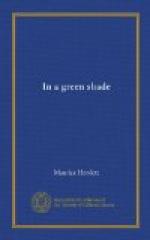“26.— ... Walked to the top of a high hill to see a fortification. Again sat down to feed upon the prospect; a magnificent scene, curiously spread out for even minute inspection though so extensive that the mind is afraid to calculate its bounds....”
Coleridge was with them most days, or they with him. Here is a curious point to note. Dorothy records:
“March 7th.—William and I drank tea at Coleridge’s. Observed nothing particularly interesting.... One only leaf upon the top of a tree—the sole remaining leaf—danced round and round like a rag blown by the wind.”
And Coleridge has in Christabel:
The one red leaf, the last of its clan,
That dances as often as dance it can,
Hanging so light, and hanging so high,
On the topmost twig that looks up at the
sky.
William, Dorothy, and Coleridge went to Hamburg at the end of that year, but in 1800 the brother and sister were in Grasmere; and the journal which opens with May 14, at once betrays the great passion of Dorothy’s life:
“William and John set off into Yorkshire after dinner at half-past two o’clock, cold pork in their pockets. I left them at the turning of the Low-Wood bay under the trees. My heart was so full I could hardly speak to W., when I gave him a farewell kiss. I sate a long time upon a stone at the margin of the lake, and after a flood of tears my heart was easier. The lake looked to me, I know not why, dull and melancholy, and the weltering on the shore seemed a heavy sound.... I resolved to write a journal of the time till W. and J. return, and I set about keeping my resolve, because I will not quarrel with myself, and because I shall give William pleasure by it when he comes again....”
“Because I will not quarrel with myself!” She is full of such illuminations. Here is another:
“Sunday, June 1st.—After
tea went to Ambleside round the
lakes. A very fine warm
evening. Upon the side of Loughrigg
my heart dissolved in what
I saw.”
Now here is her account of a country funeral which she reads into, or out of, the countryside:
“Wednesday, 3rd Sept.— ... a funeral at John Dawson’s.... I was affected to tears while we stood in the house, the coffin lying before me. There were no near kindred, no children. When we got out of the dark house the sun was shining, and the prospect looked as divinely beautiful as I ever saw it. It seemed more sacred than I had ever seen it, and yet more allied to human life. I thought she was going to a quiet spot, and I could not help weeping very much....”
The italics are mine. William was pleased to call her weeping “nervous blubbering.”




